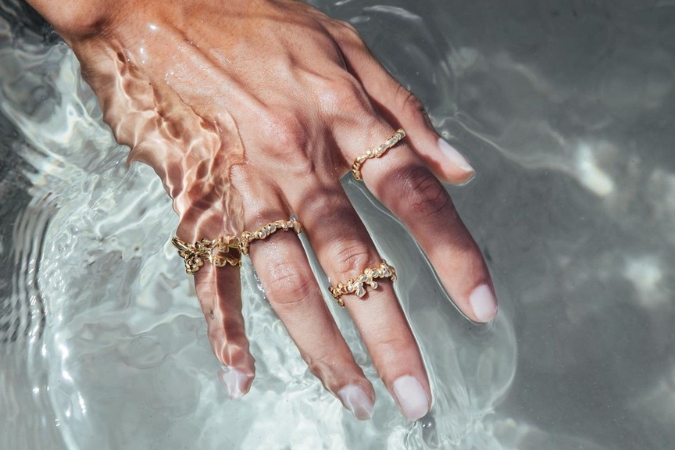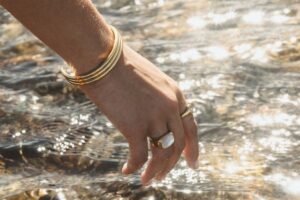Going to the pool, ocean, or seaside is fun and relaxing, but the aftermath of this enjoyable experience is that you may realize that your jewelry got damaged. This is because it’s not all jewelry can withstand water.
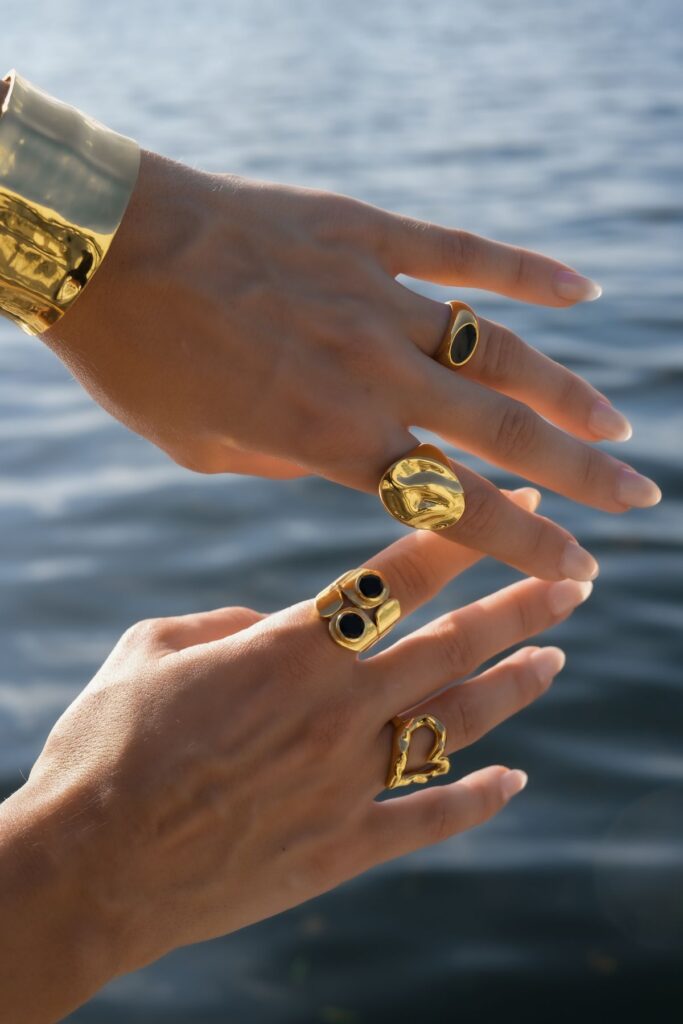
The safety of your jewelry when coming in contact with water is dependent on the type of material it’s made with. In this article, we will explore the various jewelry you can swim in and the composition of the materials used in making these waterproof and ocean proof jewelry pieces.
Does Pool and Salt Water Damage Jewelry?
Yes, pools and salt water damage jewelry, especially when exposed for a long time.
Typically, pool water itself poses less risk to the jewelry, rather it’s the chemical used to clean the pool (usually chlorine). Does chlorine tarnish silver and other jewelry types? Yes, chlorine damages all types of jewelry, including silver. It causes corrosion and affects the shine & luster of the jewelry.
Does saltwater tarnish silver and other jewelry? Salt water is composed of many elements, such as salt, magnesium, sodium, chloride, and calcium, which are harmful to jewelry.
But you can prevent this by making sure you only buy pool and saltwater proof jewelry that has passed through various waterproof jewelry inspection testing methods.
| Jewelry Material | Pool Safe | Ocean Safe | Tarnish Resistance | Durability in Water | Notes |
| Sterling Silver | ⚠️ Limited | ⚠️ Limited | ⚠️ Limited | ⚠️ Limited | Tarnishes quickly; lasts longer with rhodium-plating and e-coating. |
| Stainless Steel | ✅ Yes | ✅ Yes | ✅ High | ✅ Excellent | Best option for waterproof and oceanproof use. |
| Gold Vermeil | ✅ Yes | ✅ Yes | ✅ Medium-High | ⚠️ Moderate | More durable than gold plating, but not advisable for prolonged exposure. |
| Gold Filled | ✅ Yes | ✅ Yes | ✅ High | ✅ Very Good | Suitable for short-term swimming, not for prolonged exposure. |
| 14K & 18K Solid Gold | ✅ Yes | ✅ Yes | ✅ High | ✅ Very Good | 24k solid gold is the best among other karat of solid gold. |
What Jewelry is Waterproof & Ocean Proof?
You don’t necessarily have to remove your jewelry when going to the pool. However, that jewelry is safe in the pool or ocean for short-term doesn’t mean it’s 100% waterproof. It’s not advisable to be in water for a long time with your jewelry on.
These are the most reliable waterproof and ocean safe jewelry:
Sterling Silver Jewelry
Can you wear sterling silver in the pool? Yes, you can. Sterling silver is a composition of 92.5% pure silver and 7.5% alloyed metals (like zinc, copper, and nickel).
Pure silver, in its purest form, is soft and not suitable for creating jewelry. It gets damaged and loses its shape easily. Sterling silver jewelry, on the other hand, is tougher thanks to the alloyed metals. And when it’s rhodium-plated or e-coated, it becomes resistant to water (though not 100% waterproof).
Stainless Steel Jewelry
What metal doesn’t tarnish in water? This answer is Stainless Steel – it is composed of several materials that are waterproof, such as carbon, nickel, iron, manganese, molybdenum, and chromium. Among all these materials, “chromium” stands out and makes up at least 10% of the stainless steel composition.
When your jewelry comes in contact with water, chromium reacts with oxygen to form a hard, resistant oxide layer that prevents the water from causing damage. An original stainless steel jewelry from a professional custom jewelry manufacturer can last for a lifetime without tarnishing.
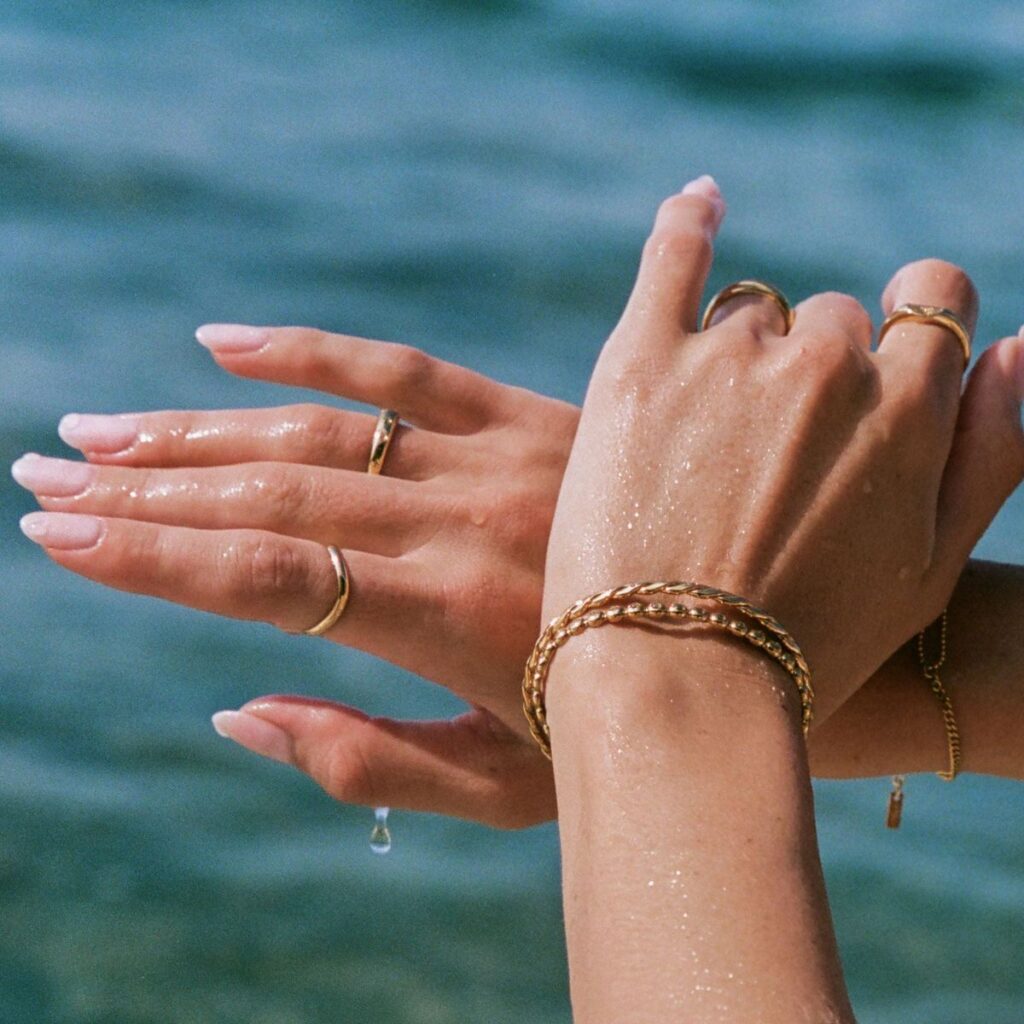
Gold Vermeil Jewelry
This jewelry is a composition of a sterling silver base metal and electroplated gold layer. The gold layer must be at least 2.5 microns thick. Gold vermeil jewelry is a popular choice amongst jewelry lovers because of the shine and toughness of the sterling silver, as well as the beauty and brilliance of the gold layer.
Gold vermeil is a pool safe jewelry because of its packed composition and it’s less likely to fade, tarnish, corrode, or wear off.
Gold Filled Jewelry
This jewelry is similar to gold vermeil, but it involves bonding the gold on a brass/silver base metal. The gold layer must be at least 5% of the gold filled jewelry total weight, and it is mechanically bonded using heat & pressure or through chemical bonding.
The electroplating thickness makes it highly durable and a pool safe jewelry that’s less likely to tarnish, and it can last for 3-5 years. However, it’s not the go-to for frequent swimming.
Solid Gold Jewelry
Just like other waterproof jewelry, solid gold is a composition of different materials (pure gold and alloyed metals). While pure gold is naturally soft, the added metals like copper and zinc make the jewelry stronger and capable of withstanding water.
There are different karats of solid gold (i.e., the percentage of pure gold to alloyed metals).
- 10K: Composed of 41.7% pure gold and 58.3% alloyed metals.
- 12K: Composed of 50% pure gold and 50% alloyed metals.
- 14K: Composed of 58.5% pure gold and 41.5% alloyed metals.
- 18K: Composed of 75% pure gold and 25% alloyed metals.
- 22K: Composed of 91.7% pure gold and 8.3% alloyed metals.
Karat gold like 9K, 14K/18K solid gold jewelry are trustworthy to retain their shine and withstand water.
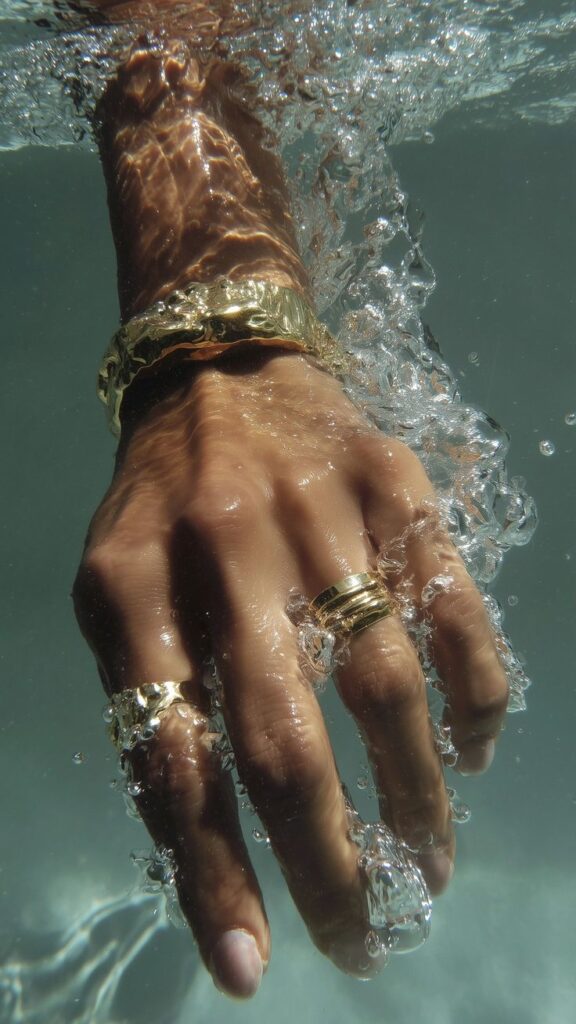
Can You Swim with Gold Jewelry?
Yes, but it depends on the karat. It must be a chlorine proof jewelry and this is only offered by higher karat of gold (14K and above). They are the types of gold jewelry that won’t tarnish easily. However, they shouldn’t be worn for long swims, as chlorine can damage the prongs and gems.
Can You Swim with Gold Plated Jewelry?
Not advisable. The gold layer on gold plated jewelry is usually thin and wears off quickly when it comes in contact with chlorine, salt, and friction.
Can You Swim with Gold Filled Jewelry?
If it is just short-term contact with pool water, you can swim with gold filled jewelry. But gold filled jewelry is not an entirely ocean proof jewelry. While the gold layer is bonded firmly and at least 5% of the jewelry total weight, it can still wear off from prolonged exposure to water.
Can You Wear 14K or 18K Gold in the Pool or Ocean?
14K and 18K are jewelry you can swim in the pool with, but it’s advisable that you take them off if it’s going to be a long swim. 18K gold can survive better than 14K because of its higher karat. On the other hand, it’s not advisable to wear either of these gold jewelry in the ocean. The salt in the ocean can cause corrosion and serious damage.
Can You Wear Sterling Silver in the Pool or Ocean?
If your sterling silver jewelry is not coated, it’s better to take it off. Sterling silver pieces with rhodium coating or e-coating provide resistance to water and are less likely to tarnish. However, they are still not recommended for long exposure to water.
Can You Wear Stainless Steel in the Pool?
What jewelry can you wear in the pool with little worry? Stainless steel. It contains chromium, which is a powerful element that withstands water. In general, it performs best among other materials.
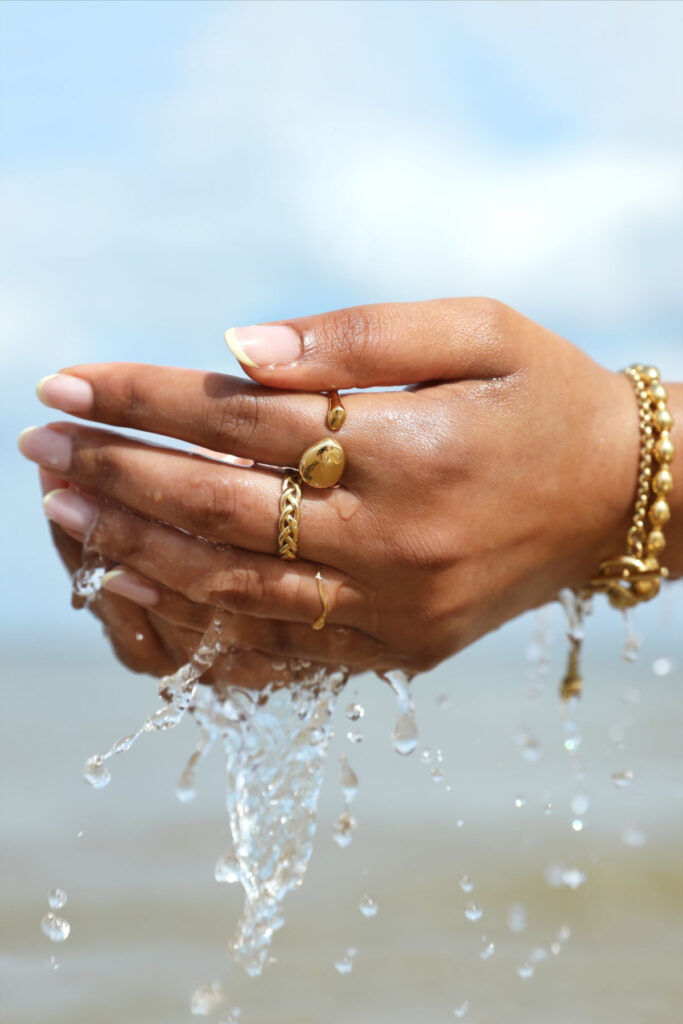
What is the Best Jewelry to Wear in the Ocean/Pool/Shower?
- Stainless Steel Jewelry: This tops the list on what jewelry can you wear in the ocean/pool/shower because of its excellent composition, with 10% of it being chromium – a tough element for stopping moisture.
- Sterling Silver Jewelry (with Rhodium Plating): When plated with rhodium or e-coated, sterling silver jewelry becomes stronger and capable of withstanding water.
- Gold Vermeil Jewelry: Not the very best ocean proof jewelry but ideal for short term exposure to water. Its sterling silver base and electroplated gold layer make it more durable.
- Gold Filled Jewelry: The bonded gold layer forms 5% of the jewelry total weight, giving the base metal extra strength to withstand water for a short term.
Conclusion
Looking great shouldn’t be limited to only outside the pool, ocean, or shower. We’ve explored the various jewelry you can swim in and that can resist water effects. However, it’s important to remember that they are not always suitable for long-term exposure, especially for pools that are treated with chlorine, as well as ocean water because they contain salt.
Would you like to get durable jewelry you can swim in and shower with, you can contact us. Tell us your needs, our best experts are on standby to speak with you.
